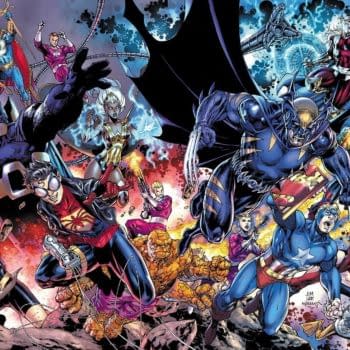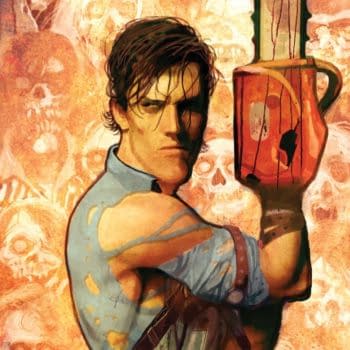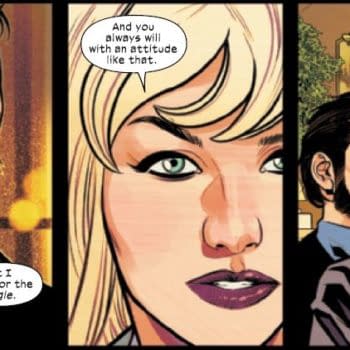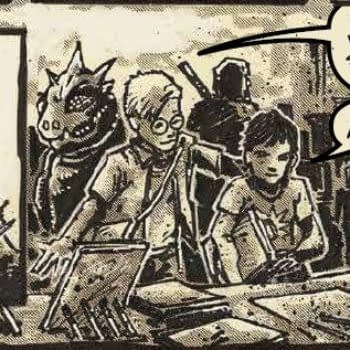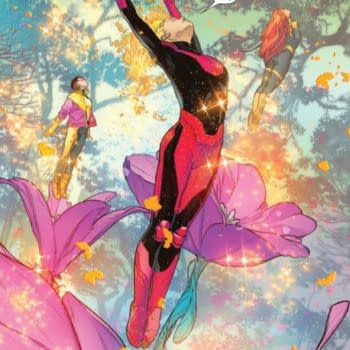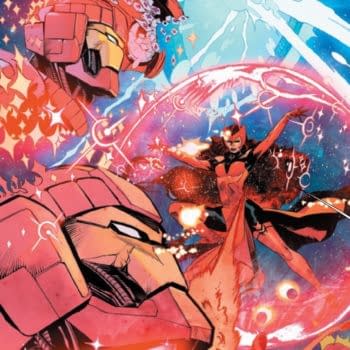Posted in: Comics, NYCC, Spider-Man | Tagged: buddy scalera, Comics, entertainment, Event Comics, joe quesada, luke cage, marvel, NYCC
Joe Quesada On His Career, Unmarrying Spider-Man And His Plans For World Domination
By Hugh Sheridan
Buddy Scalera interviewed Joe Quesada at a panel at New York Comic Con this week.
Quesada came in a little late and immediately said "okay let's get naked!"
"Oh, wrong panel, sorry"

Quesada, channeling Donald Trump, demurred – "well some people are saying that – I don't know but people are saying we crashed Netflix"
Scalera talked about how busy Quesada is in his role as Marvel creative director, being involved with Marvel's various TV and animation projects – how does he manage?
"Well, I'm always late"
"I've been blessed in that I love what I do; I've told my friends if you ever hear me complain about my job slap me in the face"
"I get up early every day and just get to work. That's how I manage, though some people might say that I don't manage it as well as I should"
Scalera asked Quesada about his time as a small publisher, at Event Comics in the mid-90s and what he learned from that experience?
Quesada talked about setting up the company with his partner Jimmy Palmiotti. That they used to hang out at a bar in midtown called Openers and were there so much people thought they owned the place. While they were at the bar they would play "fantasy Editor–in-Chief" and speculate on how they would run the major publishers themselves.
They decided to put their "money where their mouth is" and set up their own company – Event Comics. They used to meet Marvel President Joe Calamari "we called him "Joey the Squid" at the bar and he would always be impressed by the amount of publicity and good press the company got, because it was "just three guys".

Scalera agreed about this and said that Quesada and Palmiotti were the "centre of the hurricane" in the New York comics community at that time and that the parties and lock-ins at Openers (later renamed Johnny Fox's Pub) were legendary.
Quesada said that this was how such a small operation as Event got such good press. But that those parties could not be held today due to the ubiquity of digital cameras.
Quesada recounted a few stories – For artist Nelson DeCastro's birthday party (DeCastro was actually present at the panel) they hired a mime who was under strict orders to "do everything Nelson would do". This "infuriated Nelson for a long time" until DeCastro decided to turn the tables and began to do increasingly "obscene things".
They hired a "fire breather" for artist Amanda Conner's birthday and almost burned the bar down because it had low ceilings. They got a poodle act for another party and an electric chair prop for another, which they had Nelson DeCastro sit in – "but Nelson did not know it was had a dry cell battery attached to it".
The parties were not really for marketing – "they were just us having fun" – but they helped with the marketing for the company and their own careers enormously.
When they went to Marvel the parties became "Marvel Knights Parties". Marvel at this point had "no budget" for them, so Quesada and Palmiotti paid for them "out of our own pockets"

Quesada said that (then Marvel President) Bill Jemas pulled him aside after lunch and offered him the position and he was very surprised and "had to take the weekend to think about it". He thought the position could amount to being "the last captain on the Titanic"; but on the other hand it could be that there "was nowhere to go but up".
While he was vacillating his wife told him "they are going to hire someone anyway, better the devil you know". So he went to Jemas with some ground terms – he wanted to start a new trade paperback program "DC was killing us in book shops and on trades" and had a few other things on the list – and he was surprised that these were things that Jemas was also anxious to change.
Scalera asked him what was the scariest and most exciting thing about taking on the job?
Quesada said it was a scary time in the industry "sales were going down lower each month". He said he remembers an editor telling him once "I think they have hit rock bottom" but they just continued to fall. So at times he worried that the industry might disappear and he would have to find a new career. But around the time that Marvel Knights debuted sales did begin to "stabilize throughout the industry" so when he started as EIC he was not as worried about a collapse.
He said the whole prospect of the job excited him "we started out asking to do just 4 characters" – with Marvel Knights, but "now we were getting to destroy everyone's childhood heroes"
Scalera asked Quesada what he felt was his most risky move during those days?

He also cited the decision to "separate Marvel's solicits from previews" hiring Brian Bendis and the mature line of titles starting with the Jessica Jones title Alias as big risks, but said that time "is a blur" and he doesn't think about it too much.
Scalera asked Quesada about his experience working as a writer on Daredevil: Father and other projects.
Quesada said it was all about "learning the craft" and that it is really valuable to learn about different creative positions, that it helps him do his job as an artist to understand the work of the writer.
He said that he has always tried to work with the best writers as there is "nothing worse as an artist" than having to put your time and effort in to a script you know is bad.
Scalera said he could see that – that when Quesada was hired the talk in industry was that he might turn Marvel in to "Image NYC" where the art was the focus, but Quesada went down a different path.
Quesada said that early Image (the incarnation of the company which emphasized over the stories) their stuff had "great art – great energy" which worked in the short term but is not a great strategy for "building a business" and for that you need get the reader's invested in the characters through "great stories".
Scalera said that he knows Quesada is a thoughtful sensitive guy and asked how he deals with all the negativity that comes with being the face of a big company like Marvel –
Quesada answered by recalling ha conversation he had with former Marvel Editor in Chief Tom DeFalco shortly after Quesada got the job. DeFalco told Quesada "you have to have a broad back – and if you don't you should quit right now" because the negativity comes with the job.
Quesada said that he thinks that fans sometimes can "see the characters as three-dimensional real people" while they can see creators as "two-dimensional characters" in some cases "with twirling moustaches". It can "be frustrating" but doesn't "keep me up at night – what keeps me up at night is the thought that a creator might be bothered or upset about something"
But when he was Editor-In-Chief he "used this to my advantage" and adopted "a wrestling persona to get fans riled up". Quesada says that he actually loves that fans are passionate and he always tried to stoke the rivalry between the companies as it "drives units" – "stirring that pot gets people talking" and was something they would intentionally do.
He says that sometimes when he travels internationally and meets people they are surprised when he is not obnoxious and rude ""Wow you're really not an asshole?" – No, I just play one on the internet"
Scalera asked Quesada about the transition he has made where he now does all his drawing digitally on a Wacom tablet –
Quesada says he loves adopting "new technologies and methods". His major was illustration – but he actually failed all his comic classes – "I failed the Will Eisner class, I failed the Harvey Kurtzman class" but only because he "didn't hand in" his final projects for those classes.
He uses a tablet not because it's faster but because he thinks it can make him "more efficient and more accurate". Ultimately it just helps him to provide the "best art I'm able to provide in the best way I can" and he doesn't want to be "caught behind the curve".
Quesada says that the "only reason comics are behind the digital curve is because of the original art market" and without it all art would be done digitally.

"Utter world domination" was the answer. He then talked about a children's fantasy book he is working on. He could not talk about its story or even title yet, but said that it's in a "pretty cartoony style" which is his "real style" as opposed to his "superhero comics style". He has been working on it off and on for several years and he hopes to have it finished soon.
Quesada was asked about what advice he would give aspiring creators?
It "all comes down to mastery" – "you have to master your craft". He advised people to just produce work as consistently as possible "writers have to write and artists have to draw" and compared it to the dedication that professional athletes need to show – "it's the same with art – you need to practice every day".
Scalera asked Quesada if he ever considered quitting the industry when it was going through tough times in the 90s?
Quesada said no – that he was always surrounded by "good, likeminded people" and "never had any doubt" that he would be able to find work.
He said that when he "fell out of Valiant" he had an opportunity to join Image in its second wave of artists". This was a very lucrative opportunity but Quesada turned it down because he didn't want to be "always known as Todd [McFarlane]'s guy or Jim [Lee]'s guy".
So he and Palmiotti started a comic company, Event Comics, at the "worst time for the industry ever". Quesada said that people shouldn't let fear of failure overwhelm them "most successful people have failed way more than you or me". The Event Comics founders "believed in ourselves" and it eventually worked out for them.
Scalera asked Quesada where he hopes to be in 10 years?
"Doing more personal stuff" was the answer. He also said that when he started working at Marvel his aim was to "leave the characters in as good a shape or even slightly better than when I found them" and referenced "unmarrying Peter Parker – which by the way was the right thing to do!" He says he hoped he has been able to "tell some good stories, spin a few good yarns".
Quesada finished up by describing how he hugged Stan Lee at a recent con appearance and told him that his work "saved my life. I don't mean I would have committed suicide if I hadn't read a particular issue of Spider-Man or anything just that I don't know where my life would be if I hadn't read those comics."
"If a kid out there feels the same because of my work, then that's good enough for me".









